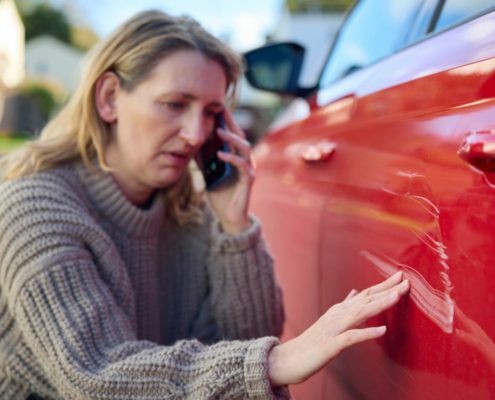Arizona Auto Insurance Guide
Get affordable Arizona auto insurance quote rates for free.
Call Now: (866) 845-3808
Compare Quotes
Get affordable Arizona auto insurance quote rates for free.
Call Now: (866) 845-3808
Arizona state laws require every motor vehicle that runs on public roads to have a minimum amount of insurance. These laws include all kinds of vehicles, like golf carts, mopeds, utility vehicles and so on.
The minimum amount of insurance you must have in AZ is:
Arizona drivers must always have proof of insurance in the vehicle. If you’re caught on the road without insurance, the penalties may be severe, and you may need to carry SR-22 insurance for a time.
Key Takeaways
In Arizona, vehicles that run on public roads and highways must be insured. AZ drivers must always carry proof of insurance in the vehicle. The minimum auto insurance requirements are:
You might hear AZ auto insurance requirements described as “25/50/15.” These numbers refer to your minimum liability coverage.
Remember that “liability” means financial responsibility. So, if you cause damage to other people or their property with your vehicle, it is your responsibility to pay for medical attention or repair damaged property.
No AZ law requires drivers to keep comprehensive coverage or collision. However, if you are making a car payment to a bank, or if there are other liens on the vehicle, the lienholder can make you buy those coverages.
Arizona drivers must have basic liability insurance on any vehicle that goes on public roads. But there are other types of auto insurance coverage available, and your lienholder may require you to carry them. You may also decide they are valuable, because they help to pay for damage to your vehicle or theft.
Other popular options include rental car reimbursement and roadside assistance.
$25,000 Bodily Injury to Others
If you’re responsible for injuring one person in an auto accident, this coverage helps to pay medical costs and more.
$50,000 Bodily Injury Per Accident for Two or More People
If you’re responsible for injuring several people, the insurer will pay up to $50,000 for medical costs and more.
$15,000 Property Damage
Most accidents cause some amount of property damage, whether it’s to other vehicles on the road, real estate, or another person’s belongings. This coverage pays for these damages. If the damage totals more than $15,000, you may need to pay more out of pocket. This is an important point, because the value of vehicles has skyrocketed in recent years.
Simply enter your zipcode to compare car insurance rates and find the best coverage.
AZ has a reputation as a freedom-loving state. But in 2021, AZ enacted a “distracted driving law.” In short, it is illegal to use your cell phone or tablet while driving. Texting while driving or speaking on a cell phone is prohibited.
First-time offenders will pay a fine ranging from $75 to $149. Repeat offenders will pay a fine ranging from $250 to $250.
If you harm others, or cause a fatality while driving distracted, the penalties can be severe. Expect:
Distracted driving in AZ could include other habits beyond cell phones. For instance, if you cause an accident while putting on makeup or eating, you could be charged with distracted driving.
If you’re caught driving without insurance in AZ, expect to pay a $500 fine for your first offense, you may also be charged extra to renew your registration, and to renew your license in the future. AZ may ask you to carry SR-22 insurance in addition to your standard auto insurance.
Repeat offenders face stiffer penalties. If you’re caught driving without insurance a second time, you will pay a $750 fine, plus the extra fees for tags and a driver’s license. Again, you may need to buy an SR-22 certificate.
Third-time offenders will be charged a $1,000 fine, plus the other added costs for a license and registration in the future.
Arizona auto insurance companies are known to gradually increase rates over time. If you need to save money on auto insurance, you should shop around every few years. Insurers will usually offer safe drivers low rates to lure new business.
Other ways to save money on Arizona auto insurance are:
Read More: 8 Simple Ways to Save You 90% On Your Car Insurance
Simply enter your zipcode to compare car insurance rates and find the best coverage.
AZ auto insurance companies classify drivers and vehicles into risk categories, the same thing happens in other states. Your price for auto insurance is based on your risk group and your behavior.
In AZ, electric vehicles (EVs), sports cars, heavy trucks, young drivers, and unsafe drivers tend to cost the most to insure.
When calculating your premium, Arizona auto insurers consider your:
AZ Auto Insurance Rates by Carrier
We scoured the web to find the best Arizona auto insurance rates for very safe drivers. Still, your cost will be based on the variables above, and some insurance companies prefer to deal with specific groups of drivers. This is called “risk appetite.”
| Insurer | Yearly Price | Monthly Premium Payment |
| Travelers | $1,295 | $108 |
| GEICO | $1,346 | $112 |
| USAA | $1,452 | $121 |
| State Farm | $1,466 | $122 |
Simply enter your zipcode to compare car insurance rates and find the best coverage.
Here are answers to the usual questions we hear about auto insurance from Arizona clients.
Is auto insurance mandatory in AZ?
Yes, you must have liability insurance to drive any vehicle on a public road in AZ. This law applies to all sorts of vehicles, including mopeds, UTVs, and the like.
Do I need full coverage auto insurance in Arizona?
There is no AZ law that says you must have full coverage insurance. Still, your lienholder may require it, and you may sleep better at night knowing your investment in a vehicle is protect from issues like theft, lightning, hail storms and so on.
What is the cheapest auto insurance in Arizona?
For safe drivers in typical private autos, our research suggests Traveler’s may be the most affordable choice. However, there are many factors insurers will consider when providing you with a quote.
How often should I shop for auto insurance?
If you shop around for auto insurance every few years, you will probably save hundreds of dollars. Insurance companies offer attractive rates to safe drivers to earn new business, but they increase these prices slowly as years go by.
Arizona Motor Vehicle Services – ADOT
Arizona Department of Insurance
 EINSURANCE
EINSURANCE EINSURANCE
EINSURANCE EINSURANCE
EINSURANCECompare Insurance Quotes & Save
